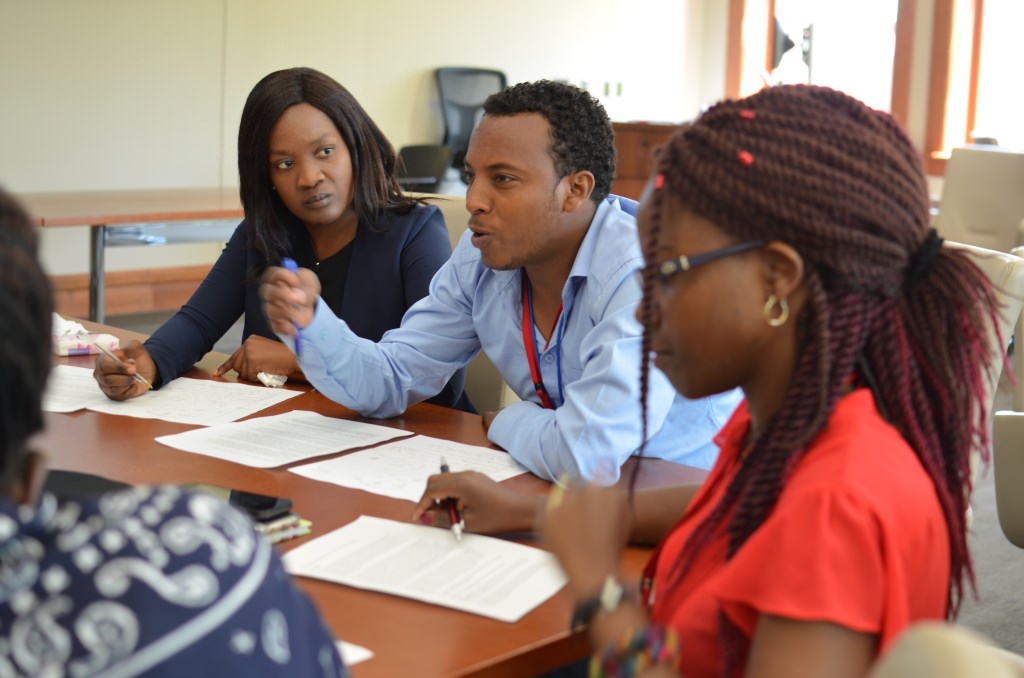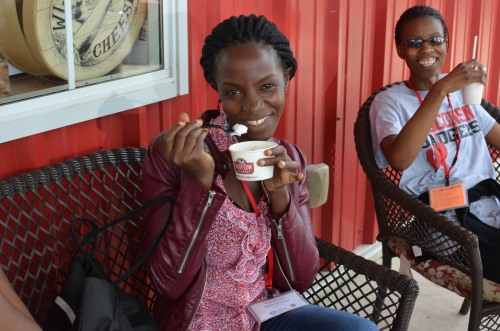African professionals, activists among 2017 Mandela Washington Fellows at UW-Madison

During an August 2016 session, Mandela Washington Fellows speak up during a constitution-making simulation with UW–Madison professor Heinz Klug. Submitted photo
In mid-June, the University of Wisconsin–Madison will welcome 25 young African leaders to campus, representing 20 countries and diverse professional fields including healthcare, law, journalism, social services, human rights and public administration.
The African Studies Program has released the names and biographies of the 25 young leaders who will spend six weeks on the UW–Madison campus as part of the Mandela Washington Fellowship.
The fellowship, sponsored by the U.S. Department of State, brings 1,000 leaders between the ages of 25 and 35 from across Africa to complete a six-week academic and experiential learning institute at U.S. institutions. UW–Madison will host 25 fellows — 15 women and 10 men. They will arrive on June 16.
“We anticipated a high-caliber group after hosting the fellowship for the first time in summer 2016,” African Studies Program Associate Director Aleia McCord said. “Once again, we are pleased to welcome a cohort of inspirational young leaders and change makers to Wisconsin.”
For example, Emmanuella Langsi, a 2017 Fellow from Cameroon, currently serves as a child protection officer in the United Nations peacekeeping mission to the Central African Republic. In this position, Langsi advocates for policies that protect the rights of children and negotiates with armed groups for the release of child soldiers. Over the last year and a half, she estimates she has influenced the lives of more than 400 vulnerable children.

Ugandan Fellow Rashida Nakabuga enjoys ice cream form Sassy Cow Creamery in 2016. Submitted photo
Sierra Leonean Fellow Abdulai Conteh has a background in mental health and psychosocial support programs. Following the 2014 Ebola crisis, which killed more than 11,000 across Guinea, Liberia and Sierra Leone, Conteh provides self-care sessions to hotline operators, burial team members and orphaned children who experienced traumatic realities on the frontlines of the outbreak. Conteh hopes to return home after the fellowship with public administration knowledge applicable to mental health delivery systems in Sierra Leone.
Diénéba Dème, a science journalist from Mali, has ambitious goals of her own. After working as a radio journalist, Dème is now engaged in the recruiting and training of science journalists, hoping to raise Mali’s profile as an international model for science journalism. “Malian science journalists will be among the best in the world,” she said.
The African Studies Program has partnered with campus entities like the Global Health Institute, the Nelson Institute for Environmental Studies, the La Follette School of Public Affairs, the Office of Quality Improvement, the Law School and the School of Education to develop academic curriculum.
When not in the classroom, learning continues through experiential site visits and community service. This year, the fellows will serve with Lussier Community Education Center, River Food Pantry, Porchlight, and Community GroundWorks. They will also step outside Madison with day trips to Columbus, northeast of Madison, and Milwaukee to learn about the unique success and challenges of these communities.
“As soon as our 2016 Mandela Fellows left, we began receiving questions about whether we would host the fellowship again,” McCord said. “We are fortunate to have a community as excited about the Fellows’ arrival as the Fellows themselves.”
Indeed, there is no shortage of excitement for the Fellows.
Dumsani Mamba will come to Madison from Swaziland and already seems to understand the value of a Madison summer. He says he is most excited about “meeting new people, being in a place I never knew existed in the United States… acquiring information and knowledge from one of the best leadership institutions and enjoying the summer in the lake.”
The fellows will be in Madison from June 16 to June 30, when they will fly to Washington, D.C. for a three-day summit with all 1,000 fellows.
The Mandela Washington Fellowship for Young African Leaders is the flagship program of the Young African Leaders Initiative (YALI) and is made possible by the support of the American people through the U.S. Department of State and administered by IREX.
Tags: Africa, international




